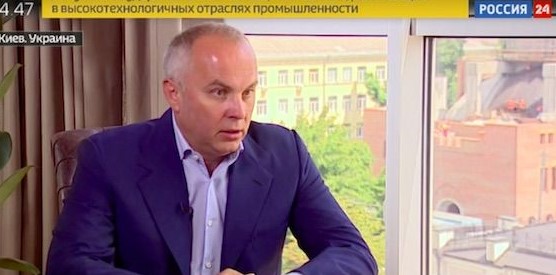Supporter of Yanukovych ‘dictatorship laws’ to head Ukraine Parliamentary Freedom of Speech Committee

Nestor Shufrych, a former cabinet minister under President Viktor Yanukovych who voted for the notorious ‘dictatorship laws’ in January 2014, has reportedly been appointed chair of the parliamentary Freedom of Speech Committee. Shufrych’s political past is only one of the reasons why media representatives have reacted with anger to the news and the media movement ‘Journalists for an Informed Choice’ have come out with a strongly-worded statement in protest.
In July 2019, Shufrych gave an interview on the Russian propaganda channel Rossiya 24 in which he claimed that the war in Donbas is a ‘civil war’, as well as repeating several other parts of Moscow’s propaganda about Ukraine over the last five years.
Shufrych was re-elected to the Verkhovna Rada in July this year as a member of the Opposition Platform – For Life party [OPFL], and this is one of the issues for the authors of the above-mentioned statement, entitled ‘The Freedom of Speech Committee cannot be placed in the hands of OPFL, whose members use media under their control for propaganda and manipulation’. That includes pro-Russian propaganda, the authors note, and cite the example of one of the leaders of OPFL, Viktor Medvedchuk. The latter is fairly notorious in Ukraine, not least, although by no means only, because of his close association with Russian President Vladimir Putin. Medvedchuk “consistently pushes the interests of the aggressor state in Ukraine , including through manipulation and censorship in the media which is effectively under his control, as has been found in many monitoring studies carried out by media NGOs.”
Three television channels – 112 Ukraine; NewsOne and ZIK now belong to Taras Kozak, whom the authors describe as a member of OPFL and a close associate of Medvedchuk. Monitoring carried out by Detector Media regularly finds that the programs on these channels mirror the propaganda messages on Russian state television. In May 2019, for example, immediately after Volodymyr Zelensky’s presidential victory, certain demands from the new administration were voiced by representatives of the Russian foreign ministry, Russian parliament and by the Ukrainian media associated with Kozak and Medvedchuk. The latter himself was the most active speaker in May, with Detector Media considering that he was transmitting Russian propaganda to the Ukrainian media. They pointed out at the time that pushing such demands with the use of popular Ukrainian media “should be viewed as subversive work for the benefit of the Russian Federation, and the spokespersons – as agents of influence of the neighbouring state”.
As reported here, it was evident in late June that the suddenly announced release of four Ukrainians held prison by the so-called Donetsk and Luhansk people’s republics had been closely coordinated both with the above-mentioned Ukrainian media and Russian state-controlled media. It was widely assumed that the release was aimed at giving an electoral boost to Medvedchuk and his OPFL party.
The statement points also to the above Ukrainian channels’ use of hate speech and gender stereotypes, as well as their manipulation of the issue of protecting freedom of speech. The latter was seen in particular after the public outrage over plans for a joint TV show between a Russian state-controlled channel notorious for its Kremlin propaganda and NewsOne. The Ukrainian channel backed out after protest, but all three Kozak / Medvedchuk channels treated this as though it were a freedom of speech issue. In fact, there are any number of examples of brazen lying, fake news and various methods aimed at pushing a false narrative about Russia’s invasion of Crimea, its pivotal role in the conflict in Donbas and about Ukraine in general. There was nothing to suggest that such a joint show would not be used for the same purposes.
The Council of Europe and the National Council on Television and Radio Broadcasting have also reported that the channels controlled by 0PFL representatives used them during both the presidential and the parliamentary elections to promote the interests of that party. It was, in fact, the immediate deterioration in press freedom and infringements of journalist ethics that resulted in the largest ever mass resignation of journalists after TV ZIK was taken over in June 2019.
‘Journalists for an Informed Choice’ point out that many members of OPFL are former Party of the Regions MPs who, like Shufrych, voted for the ‘dictatorship laws’ in January 2014. These laws were overtly aimed at crushing peaceful protest and freedom of speech, and were also adopted with flagrant infringements by the ruling Party of the Regions.
It therefore does seem extraordinary that the candidacy of Nestor Shufrych should have been put forward to head a committee which is supposed to help defend freedom of speech. The Journalists for an Informed Choice, in fact, believe it to be inappropriate for any member of the Opposition Platform – For Life to head this committee given all of the above reasons. They call on other parties to propose an authoritative media person who can command the trust of the media community, and for ‘Servant of the People’, Zelensky’s party which won an absolute majority of seats in the Verkhovna Rada, to support this candidate.
The Freedom of Speech Committee has on many occasions played an important role in defending press freedom, and there was already concern over moves to radically reduce its scope and the number of members.





